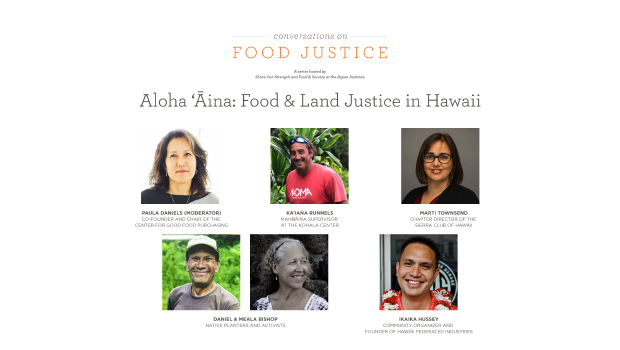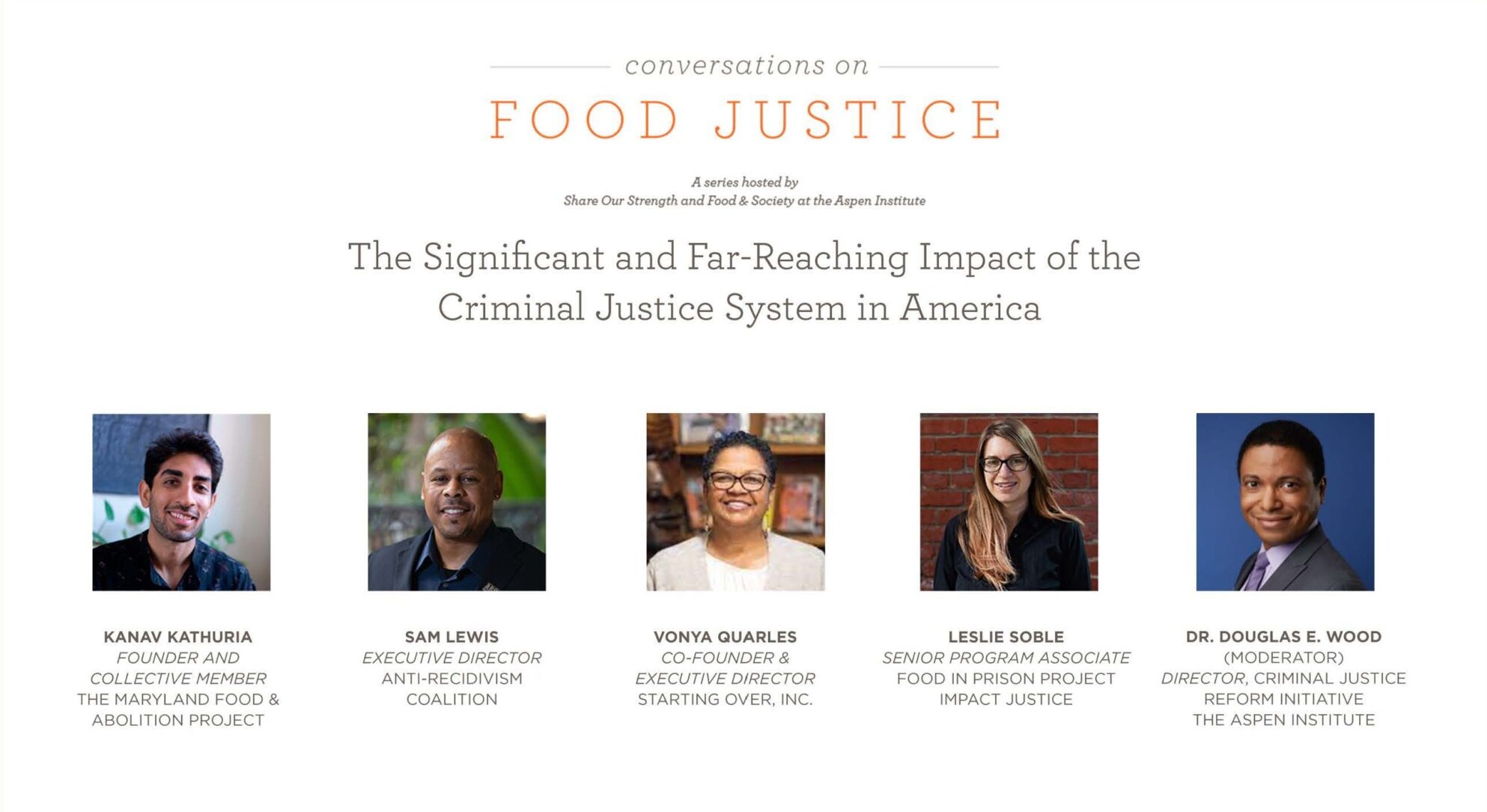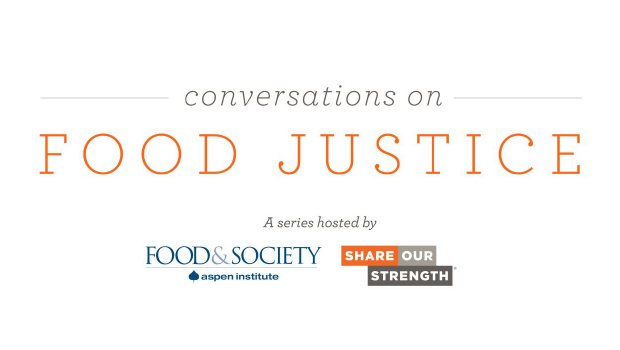While many view Hawaii as a paradise, Hawaii’s history is marked by occupation, displacement, and the struggle for control for land and water that has rapidly eroded the islands’ once vast natural food systems. From the proliferation of the sugar plantation economy that led to colonization and the overthrow of the Hawaiian monarchy, to the militarization of the islands following WWII, the legacy of foreign occupation has driven the Kānaka Maoli—the Native people of Hawaii—away from their lands and devastated Native foodways.
This session explores how occupation, militarization, and cultural appropriation have shaped Hawaii’s food systems, and how community leaders are cultivating aloha ‘āina (“love of land”) in the struggle for Hawaiian self-sufficiency by restoring Native foodways, fighting to reclaim land and water, and educating future generations about the importance of connectedness to the land. Speakers will challenge what you think you know about Hawaii, offer valuable lessons about food sovereignty and the sanctity of land, and demonstrate what role we can all play in uplifting Native foodways across the country.
Featured Panelists
Daniel & Meala Bishop, Native Hawaiian Rights Activists and Native Planters
Daniel is a member of Onipaʻa Na Hui Kalo, a community based organization dedicated to the reintroduction and rehabilitation of Kalo (Hawaiian taro) growing as a mainstay to the Hawaiian diet and way of life. He was the President of Kalo Paʻa, a non profit that ran a Community Kalo Complex located in Waiahole Valley known as Waiahole Mauka Loi. Daniel is also a member of the ʻTaro Purity and Security Task Force.
Meala is a retired community arts specialist in her ahupua’a (land division) of Ko’olaupoko, O’ahu. Meala says of her work: “Learning the truth of our Hawaiian epic, solace was achieved for me as water folk, advocate of the arts, kalo cultivator, pioneer for righting social injustices and an activist for natural resources.”
Paula Daniels (moderator), Co-Founder and Chair of the Center for Good Food Purchasing
Paula Daniels is Co-founder, Chief of What’s Next, and Chair of the Board of the Center for Good Food Purchasing. The Center for Good Food Purchasing uses the power of procurement to create a transparent and equitable food system that prioritizes the health and well-being of people, animals, and the environment, through the nationally-networked adoption and implementation of the Good Food Purchasing Program by large institutions. There are now over 50 institutions in over 20 cities across the US enrolled in this Program, which received a 2018 Future Policy award from the World Future Council, UN FAO and IFOAM Organics International.
Paula is a lawyer, and has held a number of senior positions in government in California and Los Angeles relating to water policy, coastal protection, municipal infrastructure, and food policy, including as Senior Advisor on Food Policy to Mayor Villaraigosa of Los Angeles. She has received numerous awards and recognitions, including as an Ashoka Fellow and a Stanton Fellow of the Durfee Foundation.
Ikaika Hussey, Community Organizer and Founder of Hawaii Federated Industries
Ikaika is the founder of Hawaii Federated Industries, a worker-led social enterprise aiming to strengthen Hawaii’s economy through projects in decarbonization, food security and local production. He is the former editor of Ka Wai Ola and the founder of The Hawaii Independent, Summit Magazine, and Maoliworld, and a co-editor of A Nation Rising: Hawaiian Movements for Life, Land, and Sovereignty, published by Duke University. Much of Ikaika’s energy is devoted to working on reversing climate change. He is a proud member of UNITE HERE Local 5, and a leader in The Aikea Movement, a workers rights movement seeking to build power for Hawaiians. Ikaika lives in Kalihi, and was raised in Kaneohe.
Ka’iana Runnels, Mahiʻāina Supervisor at The Kohala Center
Kaʻiana Runnels is a mahiʻai (cultivator of food and land) from the mokupuni of Moku o Keawe, in the moku of Hilo ʻAkau. His passion is to collect, identify, document, cultivate, preserve, and spread the mea kanu (food crops) of his kūpuna (ancestors). His specific focus is on kalo, ʻawa, maiʻa, and kō. His ʻike (knowledge) stems from a variety of kūpuna and hoa (friends). He first and foremost recognizes all those kūpuna who gave freely of their time and priceless naʻauao (wisdom). Along with his kuleana (duty, responsibility, right, privilege) to these mea kanu Hawaiʻi (Hawaiʻi food crops), he works to help our ʻōpio (youth) navigate personal and national sovereignty starting with their minds, then their food, and ultimately, politically. He helps to educate ʻohana (families) about food cultivation and the importance of ʻaipono (proper foods) in our everyday lives.
Marti Townsend, Chapter Director, The Sierra Club of Hawaii
Marti became the Director for the Sierra Club of Hawaiʻi in June 2015 because she wants to build a movement to reverse the climate crisis. Prior to taking on this role, she served as Executive Director of The Outdoor Circle, KAHEA: The Hawaiian Environmental Alliance, Earthjustice and the Hawaiʻi State Capitol. During those posts she was instrumental in establishing Hawaiʻi’s Environmental Court, protecting Mauna Kea’s conservation district from overdevelopment, establishing the Papahānaumokuakea Marine National Monument (and Northwestern Hawaiian Islands State Refuge), and combating environmental racism. She is a graduate of University of Hawaiʻi’s William S. Richardson School of Law, Boston University, and Moanalua High School.



